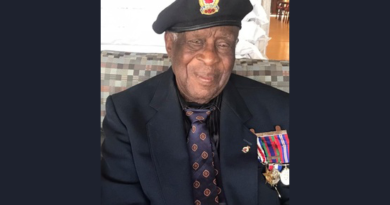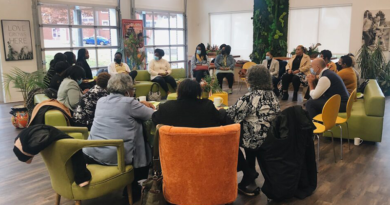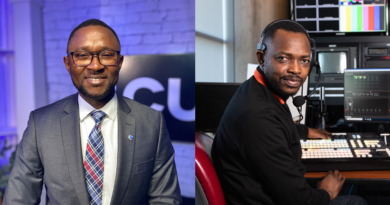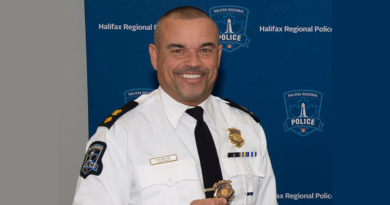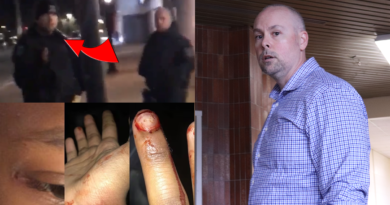‘Going through hell:’ Black HRM worker speaks at panel on equity, inclusion in workplace
SOURCE: Halifax Examiner

A worker and advocate who took part in a rally in December in support of Black Halifax Regional Municipality (HRM) workers joined a public discussion on inclusion and equity in the workplace where they said they are “going through hell” with workplace racism.
Raymond Sheppard and the worker, who the Halifax Examiner is not naming as they fear repercussions, were among more than 50 attendees at a Black History Month panel discussion Tuesday at Dalhousie University titled ‘Experiencing Inclusion and Diversity in the Workplace: Challenges and Solutions.’
Sheppard and the worker took part in a Q&A following the panel discussion.
“They seem to think that these are the buzzwords of the year, equity, diversity, inclusion, and so on, and that is supposed to satisfy and appease us as a people,” Sheppard said at the discussion. “Quite often people of European descent and some other folk tend to use these as if they’re the calling from heaven.”
“It’s good if the words ‘equity, diversity, inclusion, tolerance,’ and the whole nine yards is put into practice not just said to be a word. Because the [Black HRM] workers that I work with … they’re going through hell and back with racism in the workplace.”

Sheppard also announced he and the workers are organizing a second rally for later this month and encouraged everyone to attend.
When the HRM worker of African descent spoke at the panel discussion, they said that they and their co-workers often witness “racism under the cover of diversity and inclusion.”
“The fact that we have superintendents and supervisors who are willing to punish people of African descent for speaking out against microaggression and profiling, and then build documents on them to get rid of them, it’s not really a nice feeling as a person of African descent,” the worker told the room.
“And when you address these matters with HRM — we met with crisis management, we met with people from head office — one statement that came out of that was: ‘The racism that you’re feeling might be minute. It might not be as big as you think it is.’”
The worker said the HRM crisis management official was a woman and said she compared the plight of the workers to a cashier inadvertently referring to her as “honey” at the supermarket.
“And she said, ‘Yeah, I might feel like he’s being sexist, but that’s probably not what he means,’” the worker said.
“So, it’s nice to see the “diversity and inclusion” and Black faces on the placards and all the posters, but this has also created racism. It’s made racism more hidden. And it’s easier to undermine Black folks when they can say, ‘Oh yeah, you know, we have that policy. Here’s our report that says this was going on in HRM and we’ve addressed it.’”
“Nothing has been addressed. It’s been swept under the rug. And the fact that, even until today, there’s people who work for HRM who see us as lower-class, as the speaker said earlier, they don’t see us as humans.”
The worker said that “Black guys are trying to come up in the HRM” but that “the people from head office are undermining Black workers.”
“People were applying for training, and they would not get the training that they deserve. They would be swept under the rug [and told], ‘Oh yeah next time. Next month.’”
Citing a point made earlier by one of the panelists, the worker said that Black people can also have prejudice against other Black people and that HRM upper management uses tactics to pit some Black workers against each other.
“Because [they’re] gonna sit a Black person on the panel to be, you know, HR for the week, just to make sure [we] see there’s a Black person there represented,” said the worker.
“That doesn’t mean there’s any change, it means that they’re just trying to cover their behinds. They’re not necessarily trying to help us.”
“So, we might see a little bit of representation, but is it just window dressing? Because I see a lot of window dressing.”
‘What is their sphere of influence?’
One of the event’s panelists was April Howe, Nova Scotia’s Deputy Minister of Fisheries and Aquaculture and former senior executive advisor to the deputy minister of justice.
Howe spoke directly to the worker and encouraged those in attendance and the Black community at large to support them and the other HRM workers of African descent.
“I thank God that you’re fighting your fight. It is not only your fight. Your situation is our fight. If we let this brother travel this road on his own we do ourselves a disservice,” Howe said.

Howe agreed that mere representation and diversity inclusion in and of itself is not enough to fight anti-Black racism and other forms of discrimination.
“One of the things that I think is important when we find ourselves in situations where we have to have a voice, when we have to stand up, when we have to put ourselves at risk, put ourselves in harm’s way just to get to zero … one of the things that I like to ask is if you’re involving somebody who is of an equity [group] in this process, what is the sphere of influence that they will have? So that you can measure it,” said Howe.
“If you’re on an interview panel then I can score you, and therefore that’s my sphere of influence. But in your situation, the ‘representative’ that is on the panel, what is the sphere of influence that that voice has?”
“If they, A, can’t answer they question, then the answer is none,” said Howe. “If they, B, can answer the question, and they tell you none, or they pretty it up and it means none — those are the things we need to start asking ourselves.”
The rally
The second rally in support of the Black HRM workers will be held outside City Hall Friday, Feb. 24 at 12:30pm.
In the media release for the rally, Sheppard said it is “past time to face the truth and change the narrative. All Nova Scotians and Canadians should acknowledge and be alarmed that the pervasiveness of Anti-Black Racism in the workplace, and the belief that some may have that Anti-Black Racism does not exist is indeed racism in and by itself.”

